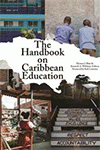
The Handbook on Caribbean Education
Edited by:
Eleanor J. Blair, Western Carolina University
Kenneth A. Williams, Anguilla Community College
Published 2021
This book brings together leading scholars of Caribbean education from around the world. Schooling continues to hold a special place both as a means to achieve social mobility and as a mechanism for supporting the economy of Caribbean nations. In this book, the Caribbean includes the Greater and Lesser Antilles. The Greater Antilles is made up of the five larger islands (and six countries) of the northern Caribbean, including the Cayman Islands, Cuba, Hispaniola (Haiti and the Dominican Republic), Puerto Rico, and Jamaica. The Lesser Antilles includes the Windward and Leeward Islands which are inclusive of Barbados, St. Vincent, Trinidad and Tobago along with several other islands. Each chapter provides a unique perspective on the various social and cultural issues that define Caribbean education and schooling. The Handbook on Caribbean Education fills a void in the literature and documents the important research being done throughout the Caribbean. Creating a space where Caribbean voices are a part of “international” discussions about 21st century global matters and concerns is an important contribution of this work.
CONTENTS
Dedication. Foreword, Kofi Lomotey. Introduction: Caribbean Education as a Portal to the Future, Eleanor J. Blair. SECTION I: TEACHING AND LEADING IN THE CARIBBEAN. Emigration of Education: The Dominican Republic’s Fleeting Education System, Jatnna Acosta. Comparing Teacher Professional Development Initiatives in Three Caribbean Countries: Implications for Leaders, Charmaine Bissessar. The Work and Professional Identity of Caribbean Teacher Educators, Carol Hordatt Gentles. Enacting Collaborative Teacher Action Research as Professional Development in the Bahamas, Gertrude Tinker Sachs. Accountability in Schools in Jamaica as a Mode of Colonization: Threats to Teachers’ Autonomy and Students’ Creativity, Shalene Chung Thomas, Carmel Roofe, Lovette Bailey, and Tian Bennett-O’Meally. SECTION II: LEARNERS AND LEARNING IN CARIBBEAN EDUCATION. Community of Learners: Using a Needs-Based Alternative Education Model to Support the Socioemotional and Academic Needs of Adolescents on the Caribbean Coast of Costa Rica, Minkie O. English and Rozanne Dioso-Lopez. Counterintuitive Gender Differences in Academic Achievement Across Socioecological Contexts Among Adolescents From Trinidad and Tobago, Nadia Jessop. Examining Early Childhood Development in the Caribbean: Working Toward Regional Improvement, Zoyah Kinkead-Clark. Bridging Cultures Between Jamaican Immigrants’ Home and U.S. Schools: A Study on Jamaican Immigrants’ Childrearing Values, Stephaney S. Morrison and Janee Steele. The Interface of Educational Systems and the Media: Framings of Male Underachievement in Jamaica Between 2002 and 2012, Oral Robinson and Sheria Myrie. SECTION III: CULTURE AND CARIBBEAN EDUCATION. Parent Involvement in Schools: Barriers Parents Face Within the Bahamian Community, Anica Bowe and Chenson L. Johnson. Shifting Paradigms: Exploring Cultural Practices as Local Knowledge Systems Trinidad and Tobago, Isabel Dennis. School Counseling in Barbados: An Ethnographic Study of the Roles, Practices, Challenges, and Demands, Dominiqua M. Griffin and Julia Bryan. “Until You Too Have Journeyed”: Empowering Teachers Through a Cross-Cultural Online Collaborative Learning Space, Aisha Spencer and Jacqueline Darvin. Weak State, Strong Diaspora: A Case Study on Education in Jamaica, Giselle Thompson. SECTION IV: STEM AND CARIBBEAN EDUCATION. Small Island Sustainability Education: Engaging Youth in Research and Education Practices for Building Sustainable Futures, Jennifer D. Adams, Sophia Perdikaris, and Rebecca Boger. Culturally Relevant Pedagogy: An Exploration of “Bridge-Building” in the Science Classroom, Susan Herbert. Addressing the Stem Gender Gap in Trinidad and Tobago, Stella Jackman-Ryan. All Means All: An Inclusive Educational Model for Panama to Address the Need for STEM and Literacy, Beverly A. King Miller. Advancing STEM Education Reform in Jamaica: Recursive Approaches to Culturally- and Contextually-Relevant Curricula Design, Theila S. Smith, Christina Siry, Jennifer D. Adams, Saran Stewart and Pauline Watson-Campbell. SECTION V: TWENTYFIRST CENTURY ISSUES IN CARIBBEAN EDUCATION. The Education Leader in the 21st Century Caribbean-Based Online Learning Environment, Aleshia V. A. Allert. Tertiary-Level Education in the Cayman Islands: Challenges and Opportunities, Byron Coon, Stacy R. McAfee, and William P. Schonberg. Dismantling Neoliberalism: Strategies Deployed by Educational Leaders in Haiti for Individual Success and Public Gain, Lucas Endicott. Constructing Regional Citizen/Ship in an Era of Mature Regionalism: A Vision of 21st-Century Caribbean Education, Tavis D. Jules and Richard Arnold. Toward a Caribbean Perspective of Global Citizenship Education: A Comparative Analysis of Education Students’ Reflexive Perspectives of Global Citizenship, Gary W. J. Pluim and Saran Stewart. Core Language Implications in Caribbean Countries and the Global Dynamic, Keisha McIntyre-McCullough, Reishma A. Seupersad, and Nicole Warmington-Granston. Conclusion— Caribbean Education: A Future of Possibilities, Kenneth Williams. Contributors. Index.
-
Paperback978-1-64802-409-2
Web price: $62.04 (Reg. 72.99)
-
Hardcover978-1-64802-410-8
Web price: $89.24 (Reg. 104.99)
- eBook978-1-64802-411-5

- EDU020000 - EDUCATION: Multicultural Education
- EDU038000 - EDUCATION: Student Life & Student Affairs
- EDU034000 - EDUCATION: EDUCATIONAL POLICY & REFORM: General
-
 Affirming Identity, Advancing Belonging, and Amplifying Voice in Sororities and Fraternities
Affirming Identity, Advancing Belonging, and Amplifying Voice in Sororities and Fraternities
-
 Creating New Possibilities for the Future of HBCUs
From Research to Praxis
Creating New Possibilities for the Future of HBCUs
From Research to Praxis
-
 Latinx College Students
Innovations in Mental Health, Advocacy, and Social Justice Programs
Latinx College Students
Innovations in Mental Health, Advocacy, and Social Justice Programs
-
 Learning to Hide
The English Learning Classroom as Sanctuary and Trap
Learning to Hide
The English Learning Classroom as Sanctuary and Trap
-
 Reflections on People, Policy, and Practices in Curriculum History
Reflections on People, Policy, and Practices in Curriculum History
-
 Special Education During the Pandemic
Considerations for Change in Practice
Special Education During the Pandemic
Considerations for Change in Practice
-
 What Comes After Lunch?
Alternative Measures of Economic and Social Disadvantage and Their Implications for Education Research
What Comes After Lunch?
Alternative Measures of Economic and Social Disadvantage and Their Implications for Education Research

